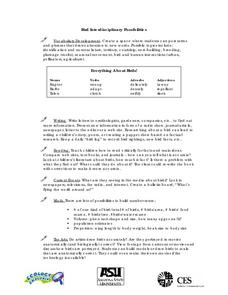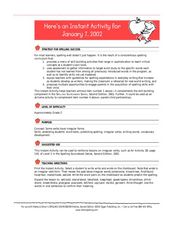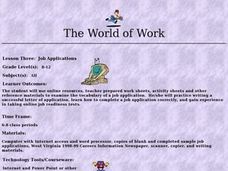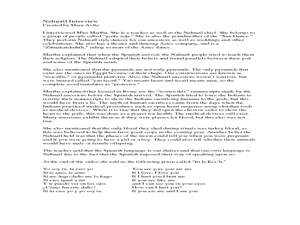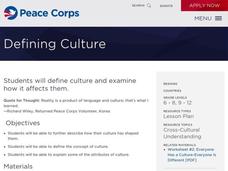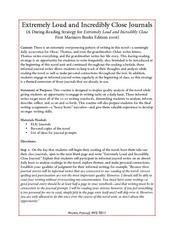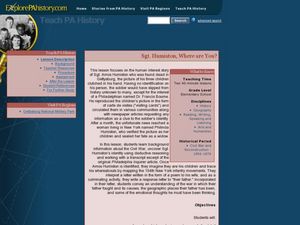Curated OER
E-Pal Adventure
Eighth graders develop online writing relationships with students from another area in their state. They write weekly regarding assigned topics, including researching information about the area in which they live.
Curated OER
Animal Report - Outlines
Fourth graders are introduced to the outline format and how to organize information from notes into a finished outline. They use a form to compile researched information into an outline in preparation for writing a final report.
Curated OER
Outlining for Beginners
Students examine the standard form of an outline by viewing several examples. They practice categorizing information and then create a simple outline.
Curated OER
Identifying Career Interests in the Volunteer and Government Sectors
Here is a great way to give your class a real-life job experience, while also serving the community. They explore a variety of volunteer opportunities to build career interests, gain work experience, and help their community grow. This...
Curated OER
Who Do You Know?
Students research and describe the contributions of African-American men and women. They write their notes in a Microsoft Word document. They present their information to the class.
Curated OER
Officer Buckle and Gloria
Young scholars write a class letter to a local policeman asking him to come and talk to the class and create a list of safety tips as a class. Students research information on police dogs: type of dogs used, where they come form, how...
Curated OER
Bird Interdisciplinary Possibilities
Students explore birds, their territory, breeding, and seasonal movement. They research and collect information on birds through writing letters to ornithologists, reading in books, comparing web sites, and observing pictures. Students...
Curated OER
Past Tense Irregular Verbs
With this worksheet, youngsters review past tense irregular words and predict the spelling of these words. They complete a worksheet where they fill in the missing letters of irregular verbs. The sheet provides the exact number of spaces...
Curated OER
The World of Work: Job Applications
Students use online resources and activities to examine the vocabulary of a job application. In this job application activity, students review and take sample online job readiness exams. Students read a publication about completing a job...
Curated OER
Avoir, Être, et Le Passé Composé
The instructional activity begins with direct instruction: how and when do we use avoir and être to form the past tense? After identifying the verbs that use either avoir or être, French learners write about five things they did the week...
Curated OER
Pick a Pet
Students design informational materials to educate people on the importance of matching a new pet to the family's lifestyle and living arrangements. Students use critical thinking skills to make a decision on the appropriate choice for a...
Curated OER
Nahuatl Culture
Students read stories, look at maps, and write journal entries to learn about the language and artwork of Nahuatl culture. In this Nahuatl culture lesson plan, students research the Nahuatl culture and present their findings.
Curated OER
Scribbleboy
Fifth graders are introduced to the text, SCRIBBLEBOY, discussing the cover page for clues to the genre. They discuss the ordinary surroundings contrasted by the graffiti and the words and phrases used to provide information about the...
Virginia Department of Education
Numbers in a Name
What's in a name? Pupils create a data set from the number of letters in the names of classmates. Each group then takes the data and creates a visual representation, such as a histogram, circle graph, stem-and-leaf plot, etc.
Curated OER
Defining Culture
Young scholars examine the role that culture plays in forming beliefs and behaviors. In this culture lesson, students describe the attributes of their culture and explain how their culture shapes them.
Curated OER
Extremely Loud and Incredibly Close: Journals
Like the characters in Jonathan Safran Foer’s novel, class members write frequently with a series of journal topics that form the basis of the final writing assignment about their personal “heavy boots.” Alas, no list of topics is...
Pennsylvania Department of Education
Giving Things a Name
Young scholars label images seen on an interactive website. In this early writing lesson, students do their best to write the name of the object seen on the screen.
Curated OER
Citizens for Responsible Change
Third graders write a petition to a school figure, get signatures from other students, share the petition with the appropriate authority, and then work as leaders to carry out the group's solution.
Curated OER
Sgt. Humiston, Where are You?
Students become familiar with the events of the Civil War. In this identification lesson, students use deductive reasoning to understand how the deceased soldier was identified. Students view primary documents for information about the...
Curated OER
Do You Haiku? We Do!
Third graders try their hands at writing Haiku, a form of Japanese poetry. Haiku is usually 17 syllables in three-line form. This engaging lesson has many excellent worksheets and website imbedded in the plan. They share their finished...
Curated OER
Our Zoo Friends
First graders plan and create a model zoo depicting the natural habitats of animals. Their models include animals and a display of written factual information about the animals. Students present their project by conductig a tour of...
Curated OER
Drugonyms
Students research information about the effects of drug abuse. They take a quiz, conduct Internet research and write a "drugonym" where each letter in the name of an assigned drug begins a new sentence or paragraph describing properties...
Curated OER
Greetings and Introductions
Students recite common forms of courtesy, greetings and leave takings appropriate to the time of day. They practice identiying the differences in forms of address for age and rank. Pupils are each given a copy of the "Greetings and...









